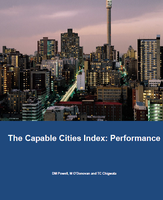MLGI releases its last Capable Cities Index
The series will be concluded with the publication of an index that combines the three indices into composite index. This Capable Cities Index provides a means to compare the overall sustainability of municipalities in terms of how well they are managed. The PI is, in turn, an amalgamation of the ranking of all municipalities (categories A, B and C) against 3 measures of performance, covering the period 2010 to 2014. The specific measures used in the Performance Index are:
· The difference in a) growth of remuneration of political officers and senior managers and b) the growth in municipal own revenue,
· Average value of debts as a percentage of service charges, and
· Average amount spent on repairs and maintenance expressed as a percentage of the value of property, plant and equipment.
The data in the PI shows that:
· Generally larger municipalities tend to have better levels of performance.
· The median PI index score of all 278 municipalities is 0.66 and half of all municipalities get more than this value.
· All but six cities (and all metros) perform at levels that exceed the national average on the performance index
· Most of the cities with a PI below the national average are from the North West Province
· While most (17) of the 27 cities attain a repair and maintenance score that is above the national average no city actually reaches the prescribed level.
· Cities are significantly better than smaller municipalities at being paid for services rendered
· Currently, the salary bill for political officers and senior management grows 4 percent faster (each year) than municipal revenue does.
· Salary inflation is significantly more pronounced in smaller municipalities.
Full report can be found here: http://dullahomarinstitute.org.za/our-focus/mlgi/the-capable-cities-index-performance/view

